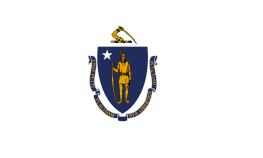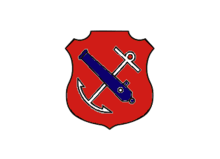57th Massachusetts Infantry Regiment
The 57th Regiment Massachusetts Volunteer Infantry was a regiment of infantry that served in the Union Army during the American Civil War. It was one of the four "Veteran Regiments" raised in Massachusetts during the winter of 1863–64. Recruits of these regiments were required to have served at least nine months in a prior unit. Colonel William F. Bartlett, at age 24 already a veteran of three regiments, organized the recruiting and formation of the 57th Massachusetts and served as its first commanding officer.
| 57th Regiment Massachusetts Volunteer Infantry | |
|---|---|
 | |
| Active | April 6, 1864 – July 30, 1865 |
| Country | |
| Allegiance | Union |
| Branch | Union Army |
| Type | Infantry |
| Size | Regiment |
| Part of | In 1864: 1st Brigade, 1st Division, IX Corps |
| Commanders | |
| 1st | Colonel William F. Bartlett |
| 2nd | Lieutenant Colonel Charles L. Chandler |
| 3rd | Captain Julius M. Tucker |
| Insignia | |
| IX Corps (1st Division) badge |  |
The regiment was attached to the IX Corps of the Army of the Potomac and took part in Lieutenant General Ulysses S. Grant's Overland Campaign in the spring of 1864. They were in extremely heavy combat during the campaign, suffering great casualties during battles which included the Battle of the Wilderness, Spotsylvania Courthouse, and the Battle of the Crater. They were involved in several assaults during the Siege of Petersburg in 1864 and participated in the spring 1865 battles which finally drove General Robert E. Lee's Confederate Army from their entrenchments in Petersburg, leading to the end of the war at Appomattox Courthouse. At the war's close, they participated in the Grand Review of the Armies
Formation and early duty
Colonel Bartlett began recruiting 57th Massachusetts in the summer of 1863. The recruits came from the western part of the state. The rendezvous and camp of instruction was Camp Wool in Worcester, Massachusetts.[1] Bartlett, a veteran of the 4th Battalion Massachusetts Infantry, the 20th Massachusetts Infantry, and the 49th Massachusetts Infantry was already considered a war hero. At age 20, he set aside his studies at Harvard College to enlist as a private. After serving his 90-day term, Bartlett became a captain in the 20th Massachusetts. He was shot in the knee during the Siege of Yorktown--a wound which required the amputation of his leg. In the summer of 1862, he returned to Massachusetts to recuperate, finish his studies at Harvard, and then organized and commanded the 49th Massachusetts. Leading that regiment in the field during the Siege of Port Hudson, Louisiana, Bartlett was again wounded. The wound badly shattered his arm and wrist and effectively removed him from command. After a very short period of recovery, he began recruiting the 57th Massachusetts. He was commissioned as its colonel on August 17, 1863.[2][3]
Recruiting of veterans progressed slowly but through Col. Bartlett's efforts, the regiment numbered a full ten companies by the spring of 1864 and was mustered into federal service on April 6. The regiment departed Massachusetts on April 18 for Annapolis, Maryland where Major General Ambrose Burnside was reorganizing his IX Corps for the spring campaign.[4] The 57th Massachusetts became part of the 1st Brigade (commanded by Col. Sumner Carruth) of the 1st Division (commanded by Brigadier General Thomas G. Stevenson) of Burnside's IX Corps. The Corps remained at Annapolis until April 23 when they were ordered to march for Washington, D.C.. From there they passed on to Arlington and eventually joined the Army of Potomac in its winter quarters surrounding Bealton Station, Virginia along the Orange and Alexandria Railroad. The regiment arrived on May 3 just as the army was leaving camp, commencing the Overland Campaign. The 57th Massachusetts bivoucked one night and then joined the forward movement with the rest of the IX Corps. The Army of the Potomac crossed the Rapidan River and the Overland Campaign commenced.[1]
See also
- Massachusetts in the Civil War
- List of Massachusetts Civil War units
Notes
- Bowen (1889), p. 699.
- Heidler & Heidler (2000), p. 185.
- Bowen (1889), p. 886.
- Massachusetts Adjutant General's Office (1931), p. 815.
References
- Bowen, James L (1889). Massachusetts in the War 1861–1865. Springfield, MA: Clark W Bryer & Co. OCLC 1986476.
- Dyer, Frederick H. (1908). A Compendium of the War of the Rebellion. Des Moines: Dyer Publishing Co. OCLC 247098372.
- Headley, Phineas Camp (1866). Massachusetts in the Rebellion : a Record of the Historical Position of the Commonwealth, and the Services of the Leading Statesmen, the Military, the Colleges, and the People, in the Civil War of 1861-65. Boston, MA: Walker, Fuller & Co. OCLC 8406829.
- Heidler, David S.; Heidler, Jeanne T. (2000). Encyclopedia of the American Civil War: a political, social and military history. New York: W.W. Norton & Co. ISBN 0-393-04758-X.
- Massachusetts Adjutant General's Office (1931). Massachusetts Soldiers, Sailors, and Marines in the Civil War. 4. Boston: Commonwealth of Massachusetts. OCLC 34938610.
- Rhea, Gordon C. (1996). The Battle of the Wilderness, May 5–6, 1864 (2004 ed.). Baton Rouge: LSU Press. ISBN 9780807118733.
- Rhea, Gordon C. (2000). To the North Anna River: Grant and Lee, May 13–25, 1864. Baton Rouge: Louisiana State University Press. ISBN 0807125350.
- Anderson, John (1896). The Fifty-Seventh Regiment of Massachusetts Volunteers in the War of the Rebellion: Army of the Potomac. Boston, Massachusetts: E.B. Stillings & Co. OCLC 30709030.